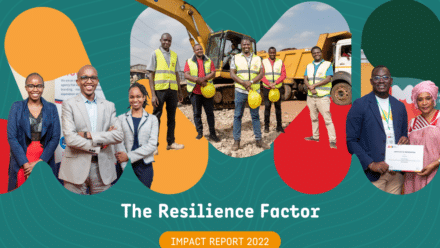Transforming MSME Support in Uganda: A New Standard for Business Development Services
13th November 2024

In 2019, the African Management Institute (AMI) and the Private Sector Foundation Uganda (PSFU) set out to transform how Micro, Small, and Medium Enterprises (MSMEs) in Uganda access support. Uganda’s entrepreneurs, spread across diverse regions, often lacked consistent, quality guidance to grow their businesses. Recognizing this gap, AMI, PSFU, and the Mastercard Foundation embarked on an ambitious initiative to establish national standards for Business Development Services (BDS). This effort aimed to create a more cohesive support system for Uganda’s MSMEs, helping them achieve sustainable growth.
The BDS landscape in Uganda was fragmented and lacked a clear quality benchmark. Many small BDS providers were concentrated in urban centers, while rural areas struggled with limited access. MSMEs were often reluctant to pay for services, citing disappointing past experiences with inconsistent support. This dynamic resulted in an ecosystem where billions in development funding were being spent on ineffective MSME training programs. It was clear that a new approach was needed to raise the standard of support for MSMEs, helping them to overcome barriers to growth and thrive.
AMI’s extensive experience in developing scalable and evidence-based training solutions provided a strong foundation for the project. Together with PSFU, they initiated the AMI GROW program, a comprehensive, practical approach to setting national standards for BDS providers. Instead of simply drafting standards, AMI and PSFU designed a system that would equip BDS providers with diagnostic tools and resources they could apply immediately to their work with MSMEs.
In 2022, AMI and PSFU took this initiative on the road. Through a cross-country roadshow, they reached BDS providers in Kampala, Gulu, Mbale, and other regions, delivering training to 200 providers and introducing them to AMI’s digital academy. The program offered practical tools tailored to diagnosing and addressing MSME needs and included licenses for providers to share the resources with the MSMEs they supported.
The response from BDS providers was overwhelmingly positive. For many, this training was their first opportunity to receive structured support and connect with peers facing similar challenges. Over 1,000 BDS providers applied, eager to participate in the pilot training, and 94% of those trained reported improvements in service delivery and increased confidence in running their businesses.
One participant, Immy Nakyeyune, the founder of Mkazipreneur, shared how the program transformed her approach. Before the training, her team offered one-off support to women entrepreneurs, lacking a continuous support model. Now, with tools like the goal-setting toolkit, Immy’s organization could guide women entrepreneurs through a structured growth path. “Goal setting was something we hadn’t focused on before,” she said. “Now, whenever a woman comes to us, we start with setting clear, actionable goals.”
Lessons Learned and Key Takeaways
The project unearthed essential lessons for implementing BDS standards effectively:
- Build Local Ownership: By involving a wide array of local stakeholders from the start, AMI and PSFU fostered a sense of ownership, increasing buy-in and ensuring the standards addressed Uganda’s unique needs.
- Standards Alone Aren’t Enough: Effective standards require practical tools. AMI’s diagnostic tools allowed BDS providers to make immediate improvements to their MSME support services, transforming abstract standards into actionable practices.
- Engage Rural Providers: In Uganda, as in much of Africa, quality BDS access is often limited outside of urban areas. AMI’s outreach beyond Kampala ensured that rural and peri-urban providers could access quality training and join a supportive network.
- Encourage Community Building: BDS providers, eager to improve their skills, benefited from the chance to engage with peers. This sense of community and shared purpose was essential for building long-term commitment to the standards.
- Create Incentive Models for Sustainability: AMI is currently exploring sustainable incentive models, such as compliance checks and the potential for a digital community, to encourage ongoing standards adoption among BDS providers.
With the standards under public review and anticipated for publication in 2024, AMI and PSFU are now focused on supporting the broader adoption of the standards. There is ongoing work to design a scalable compliance model that incentivizes providers to adhere to the standards over time, ensuring that MSMEs across Uganda benefit from high-quality support.
This initiative has already shown that standards, when implemented with the right tools and local involvement, can significantly impact MSME growth and resilience. AMI is now looking at ways to apply these learnings in other African countries, with Uganda’s success as a model for improving BDS ecosystems across the continent
Related posts

2023 Impact Report: AMI added $130M to African economies and impacted 1.5M livelihoods in first decade through support for 37,000 African businesses
African Management Institute's decade of impact: 37,000 businesses and over 94,000 individuals reached, enhancing 1.46 million livelihoods across Africa, and adding $130M to African economies since 2013

AMI’s 2022 Impact Report: The Resilience Factor
The AMI 2022 Impact Report is a tribute to the tireless dedication of these ambitious businesses, entrepreneurs, our partners and friends. Your unwavering collaboration and support have fueled our mission to empower African entrepreneurs and drive sustainable change.

AMI’s 2021 Impact Report: Skills to power growth & impact
In our recently released AMI 2021 Impact Report: Skills to power growth & impact we share how AMI’s work in 2021 - building skills for growth with businesses and their teams – helped unlock business growth, create jobs, improve livelihoods and strengthen whole systems to withstand the turbulence of our times and support thriving communities.